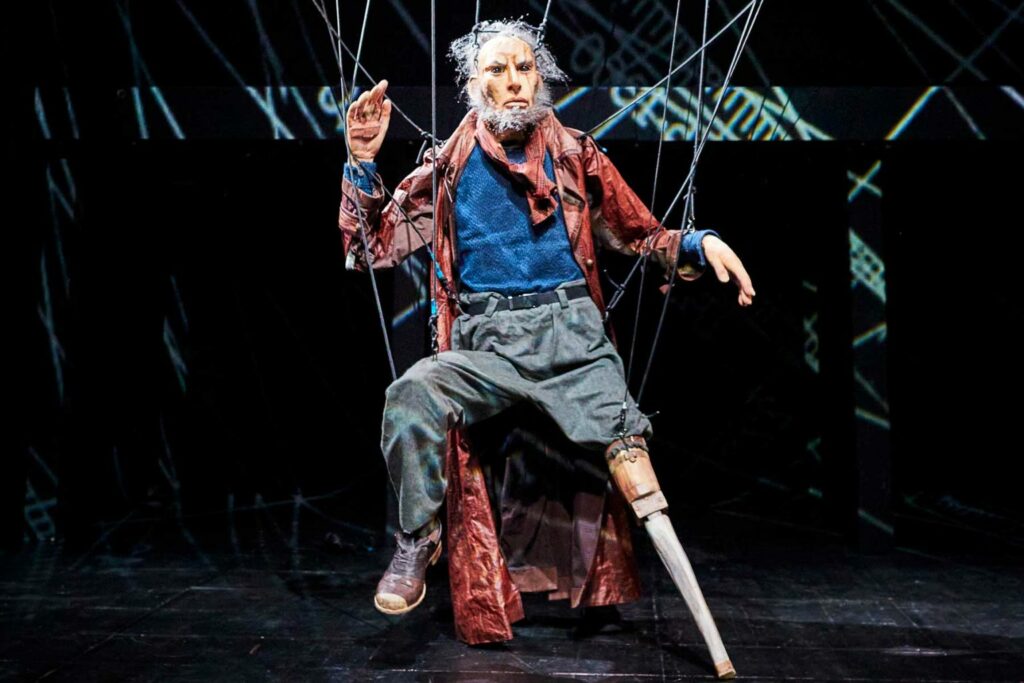Live and in person at the Fleck Dance Theatre, Harbourfront Centre, Toronto, Ont. Plays Dec. 15, 16, 2022

Based on the Herman Melville novel.
Directed by Yngvild Aspeli
No credit in the programme for the adaptor of the novel
Can we also assume Yngvild Aspeli adapted the novel (the programme doesn’t say).
Scenography by Elizabeth Holager Lund
Light designer, Xavier Lescat and Vincent Loubière
Video designer, David Lejard-Ruffet
Costume designer, Benjamin Moreau
Cast: Andreu Martinez Costa
Yann Claudel
Madeleine Barosen Herholdt
Cristina Josif
Laëtitia Labre
Viktor Lukawski
Julian Spooner
Musicians: Emil Storlekken Ase
Georgia Wartel Collins
Lou Renaud-Bailly
Yngvild Aspeli, the creative force behind Plexus Polaire her French-Norwegian theatre company, has brought her stirring, vibrant, visually striking production of Moby Dick by Herman Melville to Harbourfront for just three performances. This is the Ontario premiere of the production.
Seven actors bring 50 puppets ‘to life’ to tell the story of Captain Ahab and how he was obsessed in hunting a giant white whale, Moby Dick. The whale was the cause of Captain Ahab losing his right leg in a whaling accident. Since then, Ahab has hunted the whale for revenge without concern for the safety of his loyal crew. The hunting of the whale, no matter what, has taken over Ahab’s life and his sanity.
The story is narrated by Ishmael (“They call me Ishmael”), the only character played by an actor, a thoughtful, quietly intense Julian Spooner. He enters through the hazy dark of the lighting of Xavier Lescat and Vincent Loubière. The lighting is evocative, forbidding and compelling all at the same time. Ishmael introduces the characters and how they came to be there. The centre of that world is Captain Ahab, a mountain of a man, craggy, frowning, angry with a booming voice. Every order is given as if it might be his last, with urgency and fury. He commands his crew to hunt the great white whale. Ahab is a huge presence—his stature and size are overpowering. His hands alone are large and yet there is a gracefulness, an almost delicate balletic quality to him. His arms flow out elegantly to encompass his world. His mouth forms his booming words. His left leg is wood but that does not impede his sliding down a wall to sit on the floor. You can almost see him breathing. Except he’s full-sized puppet.
He is manipulated, as are all the puppets, by a group of accomplished, unobtrusive and hugely artistic puppeteers. They all wear black signifying that they are ‘invisible’. They all work in unison to produce the illusion that these puppets are living beings. Ahab sits at a desk with several puppeteers working his arms and hands, as Ahab turns over pages, writing with a pen on some of them (I loved that they made Ahab left-handed, when he signed documents), making each motion almost fluid in its elegance. Ahab’s voice and the puppet’s main manipulator is provided by Viktor Lukawski—deep, firm, booming and commanding.
Ahab chases after whale sightings; the whale puppets are impressive. But then we see the great white whale, Moby Dick and it is massive and again, graceful. It is held aloft by a group of puppeteers making its swimming, natural and forbidding. The three musicians create an almost other-worldly soundscape with drums, guitar, double base. The dark, watery images from the video design of David Lejard-Ruffet create its own sense of doom. We wait for the sight of that great whale. We are prepared. And when it appears it’s astonishing in its size. Ahab’s boat seems almost tiny in comparison.
For all of Ahab’s obsession with the whale, I thought it a missed opportunity that there was not a direct visual meeting of Ahab and his obsession; that when Moby Dick did destroy Ahab’s boat we don’t also see Ahab tangled in ropes around the body of that huge beast. The story leads to that idea. That Ahab just disappears on his own seems a missed opportunity.
Still, the visual realization of this compelling story with these life-sized and life-like puppets, the artistry of the performers and puppets and director Yngvild Aspeli’s keen imagination make Moby Dick one of the theatrical highlights of the year.
A Plexus Polaire Production co-presented with Why Not Theatre
Plays: Dec. 15, 16, 2022.
Running time: 85 minutes, no intermission